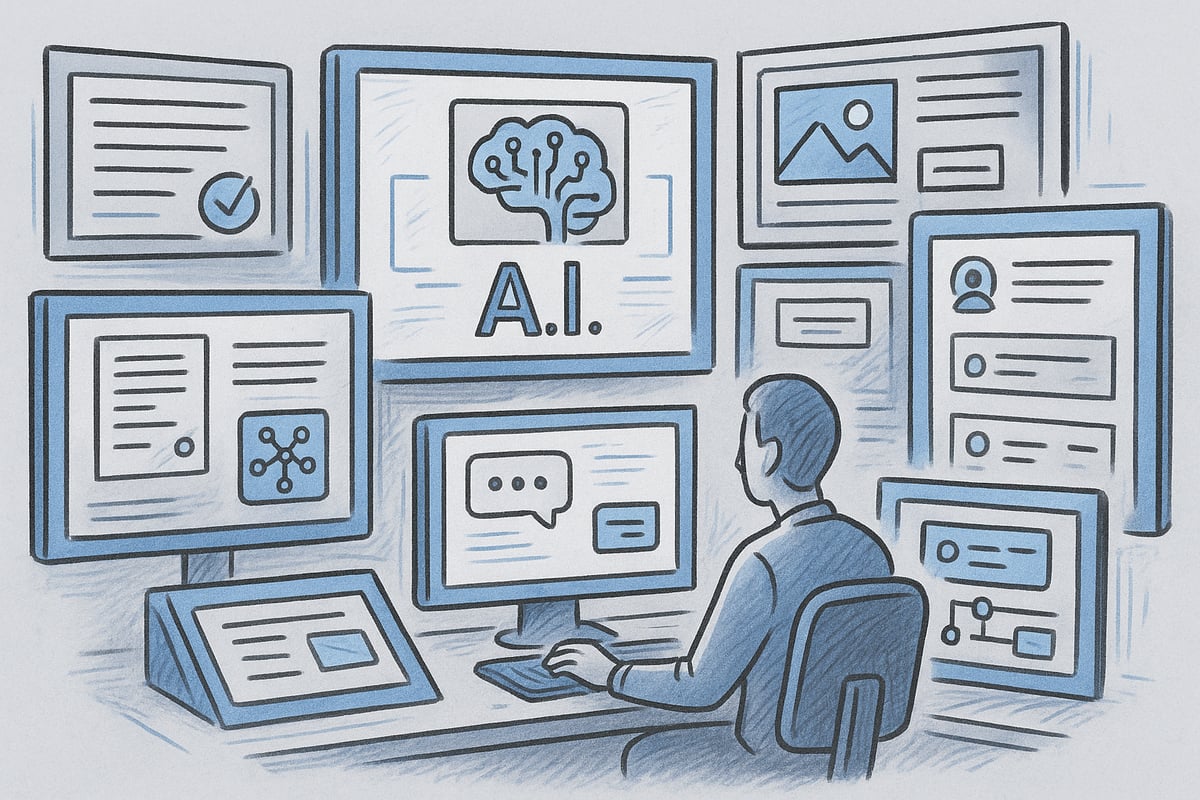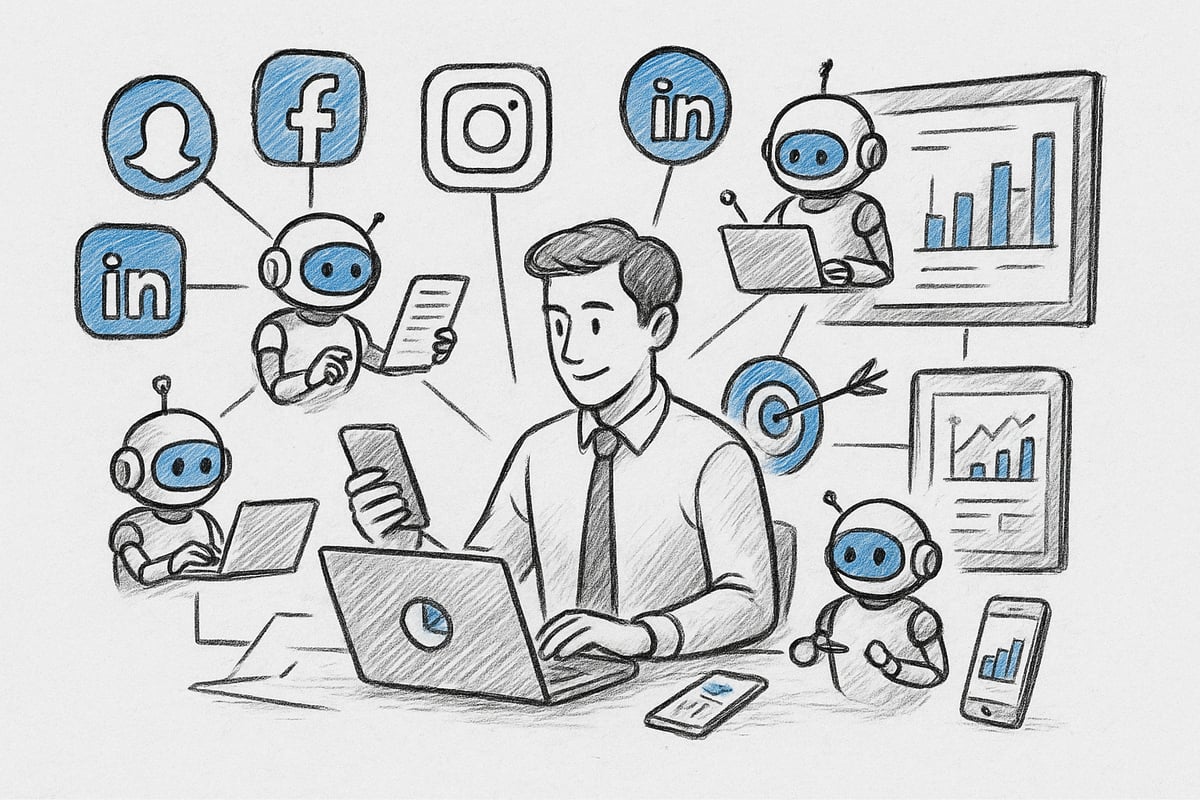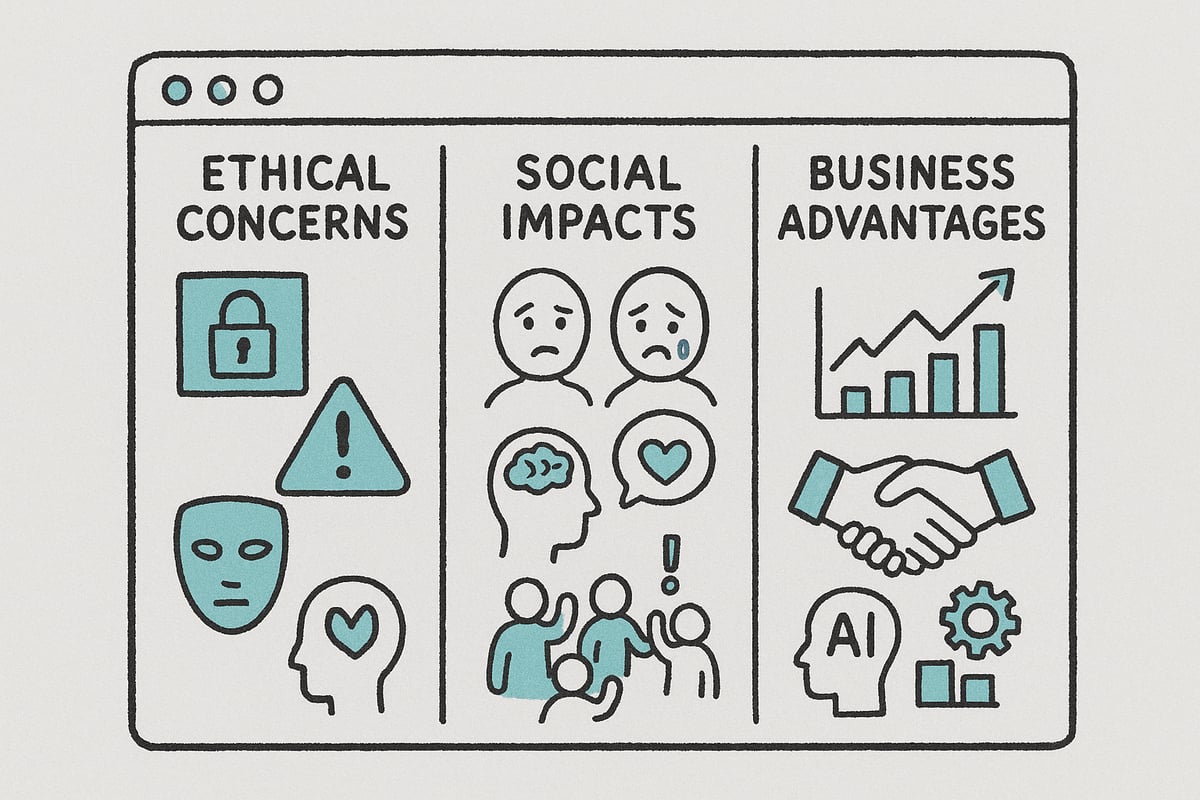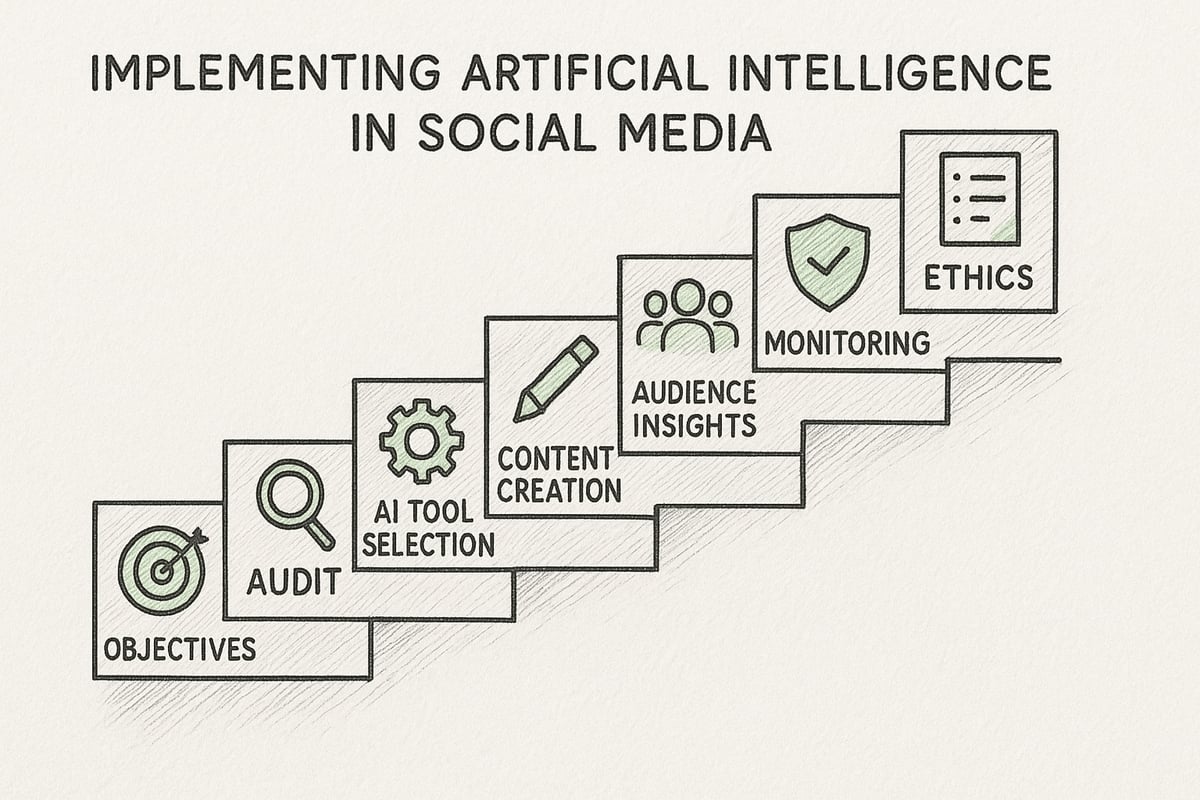Artificial intelligence in social media is fundamentally changing how we connect, share, and engage online in 2025. Every major platform now relies on AI to deliver content, moderate discussions, and target audiences with precision. This guide examines the transformative impact of artificial intelligence in social media, providing actionable insights for brands, marketers, and users. You will discover key definitions, real-world use cases, major benefits, ethical considerations, future trends, and practical steps for implementation. Ready to gain a competitive edge? Use this guide to navigate and harness AI for success in the evolving social media landscape.
Understanding Artificial Intelligence in Social Media
Artificial intelligence in social media is revolutionizing how platforms operate, analyze data, and engage users. To fully grasp its impact, let’s break down what AI is, how it’s used across social networks, which technologies drive its growth, and how it has evolved over the last decade.

What Is Artificial Intelligence?
Artificial intelligence in social media refers to the science of building systems that can interpret, learn, and act based on data, much like a human. As defined by Demis Hassabis of DeepMind, AI is about making machines smart. At its core, AI covers several key areas:
- Machine Learning (ML): Algorithms learn from data to make predictions or decisions.
- Natural Language Processing (NLP): Machines understand and generate human language.
- Computer Vision: AI recognizes and processes images and videos.
While AI is the overarching concept, machine learning is a subset that focuses on learning from data, and deep learning is a further subset that uses neural networks for complex tasks. This layered approach allows artificial intelligence in social media to see, hear, speak, write, and predict with increasing accuracy.
How Social Media Platforms Use AI
Artificial intelligence in social media platforms powers everything from content curation to user safety. Here’s how:
- Content Curation: AI decides what posts appear in your feed on platforms like Facebook, Instagram, and LinkedIn.
- Automated Moderation: Systems detect and remove inappropriate or harmful content before it spreads.
- Personalized Recommendations: AI suggests friends, pages, and ads tailored to each user.
- Computer Vision: Snapchat uses AI to apply real-time filters, recognizing faces and objects instantly.
This integration allows artificial intelligence in social media to deliver highly personalized and safer experiences for billions of users worldwide.
Key AI Technologies Powering Social Media
Several advanced technologies make artificial intelligence in social media possible:
| Technology | Description | Example Use Case |
|---|---|---|
| Natural Language Processing (NLP) | Understands text and sentiment | Sentiment analysis in tweets |
| Computer Vision | Recognizes images and video | Real-time video filters |
| Generative AI | Creates new content (text, images) | Automated post generation |
| Predictive Analytics | Forecasts trends and behaviors | Ad targeting and optimization |
These tools enable platforms to automate content creation, analyze audience reactions, and optimize marketing strategies.
Evolution of AI in Social Media (2015-2025)
The journey of artificial intelligence in social media has been rapid and transformative:
- 2015: Early stages with basic automation and simple analytics.
- 2020s: Introduction of deep learning and generative AI for smarter personalization.
- 2025: Nearly all major platforms have integrated AI for user experience and business intelligence.
Recent Social Media and AI Statistics 2025 show that AI is now a dominant force in shaping platform strategies, with research identifying content moderation and personalization as leading themes.
AI’s Role Behind the Scenes
Much of artificial intelligence in social media operates out of sight, yet its influence is profound:
- AI-driven algorithms determine which posts gain visibility and how ads are placed.
- Platforms depend on AI for scalability, handling millions of interactions seamlessly.
- The inner workings of these systems remain a "black box," making outcomes hard to predict for marketers and users.
- LinkedIn, for instance, uses AI to recommend jobs and curate user feeds, constantly refining what you see based on your activity.
Understanding these invisible processes is key for anyone aiming to leverage artificial intelligence in social media effectively.
Top Use Cases and Benefits of AI in Social Media
Artificial intelligence in social media is transforming how brands, marketers, and users interact on every major platform. From content creation to brand monitoring, AI is at the core of innovation, delivering measurable benefits and reshaping digital engagement.

Content Creation and Automation
Generative AI tools have redefined content creation for social platforms. Today, artificial intelligence in social media enables marketers to craft posts, captions, and visuals that resonate with specific audience segments. These tools can repurpose long-form articles into bite-sized posts tailored for platforms like Instagram, Facebook, or X.
For example, video clipping powered by AI automatically extracts highlights for TikTok or YouTube Shorts, saving hours of manual editing. Marketers now use AI for first drafts, creative variations, and even visual generation, which streamlines workflows and ensures consistency. According to recent data, leveraging AI can reduce content creation time by up to 50 percent.
If you want to explore the potential of automated content, check out this social media AI content generator to see how AI powers creative efficiency.
Audience Analysis and Insights
Unlocking deep audience insights is another transformative benefit of artificial intelligence in social media. AI-driven sentiment analysis sifts through thousands of posts and comments to gauge public opinion about brands or campaigns.
Machine learning models identify emerging trends, audience segments, and even predict which content will resonate next. Real-time social listening tools flag brand mentions as they happen, helping teams respond quickly and strategically. According to the Marketing AI Institute, 70 percent of leading brands now rely on AI-powered analytics to inform their social media strategy.
Content Moderation and Community Management
With billions of daily interactions, platforms depend on artificial intelligence in social media to maintain safe and positive communities. AI-powered moderation tools can instantly detect hate speech, spam, and inappropriate content, reducing risks for brands and users alike.
For example, Facebook and Instagram use automated comment filtering to block harmful language before it reaches the public. AI-driven enforcement of community guidelines ensures consistency and fairness at scale. These systems now moderate billions of comments and posts daily, enabling teams to focus on higher-level engagement.
Ad Targeting and Personalization
Artificial intelligence in social media is revolutionizing how ads reach the right people at the right time. AI analyzes user behavior, interests, and engagement patterns to optimize ad delivery and improve ROI. Predictive analytics forecast which audiences are most likely to convert, while dynamic creative optimization tailors ad formats and messaging for maximum impact.
A standout example is Facebook Ads, where AI-driven targeting algorithms continually refine campaigns for better results. Industry reports show that AI can increase ad engagement rates by up to 30 percent, giving brands a significant competitive edge.
Brand Monitoring and Crisis Detection
Real-time brand monitoring is essential in today’s fast-moving digital landscape. Artificial intelligence in social media tracks brand mentions across multiple channels, gauges sentiment, and flags potential PR crises before they escalate. AI-powered dashboards display viral trends, negative sentiment spikes, or emerging issues, equipping teams to act decisively.
Automated alerts notify rapid response teams when attention is needed most. According to ScienceDirect, 60 percent of enterprise brands use AI for social listening and crisis detection, demonstrating its critical role in proactive reputation management.
Optimizing Posting Strategies
Timing and format are crucial for social success. Artificial intelligence in social media analyzes engagement data to determine the best times to post, helping brands maximize visibility. AI-powered scheduling tools recommend optimal days and hours for each platform and audience segment.
Machine learning enables A/B testing of post formats, captions, and creative assets, ensuring continuous improvement. Brands using AI scheduling report up to 20 percent higher engagement, making AI a valuable ally in the quest for social media effectiveness.
Ethical, Social, and Business Implications of AI in Social Media
The rise of artificial intelligence in social media brings profound ethical, social, and business implications. As platforms leverage AI to deliver personalized experiences, the technology shapes how information spreads, how communities interact, and how brands achieve growth. Understanding these multifaceted impacts is essential for anyone navigating the evolving digital landscape.

Ethical Challenges and Risks
Artificial intelligence in social media introduces complex ethical challenges that demand attention from brands and users alike. Privacy is a major concern, as AI systems collect and process vast amounts of personal data to tailor content and ads. This data-driven approach can expose users to unintended privacy breaches if not managed properly.
Another risk is algorithmic bias. AI-powered moderation and recommendation engines may inadvertently promote harmful stereotypes or suppress certain viewpoints. The rapid spread of misinformation, including deepfakes and fake news, is accelerated by AI’s ability to generate and amplify content at scale. For example, deepfake videos have influenced public opinion, raising questions about authenticity and trust. ScienceDirect highlights algorithmic bias and misinformation as dominant themes in current research, underscoring the urgent need for ethical safeguards.
Social Impact and User Wellbeing
The influence of artificial intelligence in social media extends deeply into social behavior and individual wellbeing. AI algorithms shape public discourse by prioritizing certain content, potentially reinforcing echo chambers and polarizing communities.
On the positive side, AI can analyze posts to detect signs of mental health struggles, offering timely support or flagging at-risk users for intervention. Platforms are also using AI for collective intelligence, helping manage emergencies by quickly disseminating critical information during disasters. ScienceDirect has cited studies where AI-driven mental health detection has led to early interventions, highlighting both the promise and responsibility of these technologies. The social impact of AI in this context demands careful oversight to ensure user wellbeing remains a priority.
Business Value and Competitive Advantage
For businesses, artificial intelligence in social media delivers measurable value and a clear competitive edge. AI-driven personalization enhances every stage of the customer journey, from targeted ads to tailored recommendations, resulting in improved return on investment and operational efficiency.
Brands leveraging AI can quickly identify trending topics, monitor sentiment, and engage audiences in real time. Event detection powered by AI allows brands to respond to relevant conversations as they unfold. According to the Artificial Intelligence in Social Media – Global Industry Report 2025, brands adopting AI see higher growth rates and improved outcomes, confirming the business case for investment.
Key business benefits:
- Enhanced customer targeting
- Faster response to trends
- Data-driven decision making
Regulatory and Policy Considerations
As artificial intelligence in social media becomes more pervasive, the need for clear regulation and policy grows. Regulatory bodies are increasingly scrutinizing how platforms deploy AI, demanding greater transparency in algorithms that influence what users see and share.
Policymakers are working to ensure ethical AI usage, focusing on data privacy, fairness, and accountability. ScienceDirect has discussed the emergence of policy frameworks aimed at governing AI practices in social media, reflecting the industry’s evolving landscape. For brands, staying informed about regulatory developments and ensuring compliance is critical to maintaining trust and avoiding legal pitfalls.
Case Studies and Real-World Examples
Real-world applications illustrate the diverse impact of artificial intelligence in social media. Facebook employs AI for content moderation and highly targeted advertising, helping maintain a safe and relevant user experience. LinkedIn uses AI to recommend jobs and curate feeds, connecting professionals with tailored opportunities. Snapchat’s computer vision technology powers dynamic filters that engage users in creative ways.
Many brands have achieved measurable success by integrating AI into their social strategies, gaining both social impact and higher ROI. These examples demonstrate how AI shapes user experience, business outcomes, and the broader digital ecosystem.
Step-by-Step Guide to Implementing AI in Your Social Media Strategy
Implementing artificial intelligence in social media might seem daunting, but with a clear roadmap, any brand or marketer can unlock its potential. This step-by-step guide breaks the process into manageable actions, ensuring you maximize efficiency, insight, and impact.

Step 1: Define Objectives and Key Metrics
Begin by clarifying what you want to achieve with artificial intelligence in social media. Are you aiming to boost engagement, increase sales, or enhance brand awareness? Pinpointing objectives ensures your AI strategy aligns with business goals.
Next, select measurable key performance indicators (KPIs). Common metrics include reach, sentiment, conversion rates, and audience growth. Align these KPIs with your chosen objectives for clear benchmarks.
| Objective | Example KPI |
|---|---|
| Engagement | Post interaction rate |
| Brand Awareness | Impressions, reach |
| Sales | Conversion rate |
By defining objectives and metrics at the start, you lay a strong foundation for using artificial intelligence in social media effectively.
Step 2: Audit Current Social Media and Data Infrastructure
Conduct a comprehensive audit of your existing social media channels, content, and data sources. Evaluate which platforms you use, the types of content you produce, and the analytics tools currently in place.
Identify gaps in automation, analytics, and moderation. Are you missing real-time insights or advanced content scheduling? Benchmark your present performance using AI-powered analytics to highlight areas for improvement.
This step ensures your infrastructure can support the integration of artificial intelligence in social media and helps prioritize where to focus your initial efforts.
Step 3: Choose the Right AI Tools and Platforms
Selecting the best tools is crucial for a successful artificial intelligence in social media strategy. Compare solutions for content creation, analytics, and automated moderation. Consider factors such as scalability, integration capabilities, and data privacy compliance.
Key criteria for tool selection:
- Ease of integration with existing platforms
- Robust analytics and reporting features
- Customization and scalability
- Strong privacy and security measures
For a detailed review of top solutions, visit AI tools for marketing success. The right choice will empower your team to innovate and adapt as your strategy evolves.
Step 4: Integrate AI for Content Creation and Scheduling
Once you have chosen your tools, start integrating artificial intelligence in social media workflows. Use generative AI to write posts, create images, or generate video snippets tailored for each platform.
Leverage automation to schedule posts at optimal times, based on AI-driven engagement predictions. AI can also help repurpose blog articles into bite-sized social content, streamlining your creative process.
For practical steps and use cases, the Artificial intelligence marketing solution guide provides actionable examples. This integration saves time and enhances content relevance for your audience.
Step 5: Leverage AI for Audience Insights and Personalization
Deploy artificial intelligence in social media to unlock deep audience insights. Set up sentiment analysis to monitor brand perception and trend detection to identify emerging topics.
Use AI to segment your audience and personalize content or ads. Real-time dashboards allow for on-the-fly campaign adjustments, ensuring your strategy remains agile.
Personalization driven by AI not only increases engagement but also builds stronger connections with your followers, making your messaging more impactful.
Step 6: Monitor, Moderate, and Optimize Continuously
With artificial intelligence in social media, proactive monitoring and moderation become seamless. Use AI to track brand mentions, detect crises, and automatically moderate comments or messages.
Implement continuous optimization through AI-driven A/B testing and analytics. This approach helps you refine your content, posting times, and community management strategies for better results.
Regularly review performance data and adjust your tactics to maintain alignment with your business objectives and evolving audience preferences.
Step 7: Address Ethics, Compliance, and Transparency
The final step is to ensure your use of artificial intelligence in social media meets ethical and regulatory standards. Develop clear guidelines for ethical AI use, focusing on privacy, transparency, and fairness.
Stay updated on data privacy laws and platform regulations. Communicate openly with users and stakeholders about how AI shapes their experience.
A transparent and responsible approach not only builds trust but also safeguards your brand reputation as artificial intelligence in social media becomes more prevalent.
Future Trends and Emerging Themes in AI for Social Media (2025 and Beyond)
Artificial intelligence in social media is poised for unprecedented advancement as we look toward 2025 and beyond. Brands, marketers, and users are set to experience new levels of innovation, engagement, and complexity. Let us explore the most influential future trends shaping the next era of social platforms.
Generative AI and Content Innovation
Generative AI is revolutionizing content creation across all major platforms. In 2025, artificial intelligence in social media will enable brands to produce highly personalized videos, images, and text at scale. Automated video generation from long-form content will become routine, saving marketers significant time and resources. These tools can adapt visuals and messages for each audience segment, ensuring relevance and engagement.
Recent industry reports suggest that the adoption of generative AI is a main driver behind the projected market growth. For a comprehensive look at these trends and forecasts, review the AI in Social Media Market Report 2025. As platforms compete on content quality and speed, the ability to generate tailored media will define competitive advantage.
Conversational AI and User Experience
Conversational AI is transforming how users interact with brands on social media. AI-powered chatbots and virtual assistants now deliver real-time customer support, handle routine queries, and even moderate discussions. In 2025, artificial intelligence in social media will drive the growth of intelligent direct messages, automated comment responses, and proactive engagement.
These conversational agents are becoming more context-aware, enabling seamless, human-like conversations. As a result, brands can nurture relationships, resolve issues quickly, and provide a consistent user experience. Expect even deeper integration of conversational AI tools across all touchpoints in the coming years.
Deep Sentiment Analysis and Emotional Intelligence
Understanding user emotions is critical for effective engagement. Deep sentiment analysis powered by artificial intelligence in social media allows platforms to detect nuanced feelings in text, audio, and video. Advanced models can spot subtle cues indicating satisfaction, frustration, or distress, enabling brands to respond with empathy and precision.
This technology also plays a pivotal role in mental health monitoring and crisis detection. Platforms are leveraging AI to flag at-risk users and connect them with appropriate resources. As emotional intelligence tools advance, expect more accurate and timely interventions for both brand reputation and user wellbeing.
Algorithmic Activism, Bias, and Fairness
As artificial intelligence in social media becomes more pervasive, the scrutiny of algorithmic decision-making intensifies. Platforms are under pressure to ensure that AI-driven recommendations and moderation are fair, transparent, and free from bias. Efforts to mitigate algorithmic bias include regular audits, explainable AI models, and user-facing transparency reports.
Algorithmic activism is another emerging theme, with users and advocacy groups challenging platforms to uphold ethical standards. Moving forward, balancing innovation with fairness will be central to fostering trust and equitable digital spaces.
The Metaverse, Collective Intelligence, and New Frontiers
The integration of artificial intelligence in social media is accelerating the rise of metaverse platforms, where virtual communities interact in immersive environments. AI curates virtual events, facilitates real-time analytics, and enables collective decision-making on a global scale. These new frontiers blend social networking with gaming, commerce, and education.
For further insights into how the market is expanding and the key drivers shaping these innovations, see the AI in Social Media Market Report 2025. As these technologies mature, expect artificial intelligence in social media to redefine how we connect, collaborate, and create value online.
